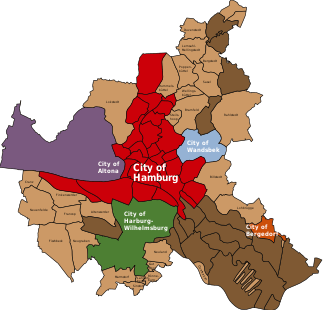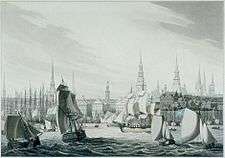Greater Hamburg Act
The Greater Hamburg Act (German: Groß-Hamburg-Gesetz), in full the Law Regarding Greater Hamburg and Other Territorial Readjustments (German: Gesetz über Groß-Hamburg und andere Gebietsbereinigungen), was passed by the government of Nazi Germany on 26 January 1937, and mandated the exchange of territories between Hamburg and the Free State of Prussia. It became effective on 1 April 1937.[1]

City of Hamburg
City of Bergedorf (to Hamburg since 1868)
former rural areas of Hamburg (including City of Hamburg), remaining to Hamburg)
Incorporated City of Altona
Incorporated City of Wandsbek
Incorporated City of Harburg-Wilhelmsburg
Incorporated rural territories
Part of a series on the |
|---|
| History of Hamburg |
 |
| by timeline |
|
Prehistory and Antiquity
|
|
Middle Ages
|
|
Early Modern
|
|
|
Modern
|
|
Contemporary
|
| by other topic |
|
Political and economic history
|
|
|
Larger Hamburg
Hamburg lost most of its exclaves, including Geesthacht and Cuxhaven. In return, Hamburg was enlarged by including formerly Prussian towns like Altona, Wandsbek, and Harburg-Wilhelmsburg as well as a number of villages. Altona and Wandsbek had been part of the Prussian province of Schleswig-Holstein, while Harburg-Wilhelmsburg had been a part of the Prussian province of Hanover. This represented the formal merger of what had previously been referred to as the "Four-City Region".
Lübeck
Besides the regulations for Hamburg, the law incorporated most of the Free City of Lübeck into the Prussian province of Schleswig-Holstein, though some smaller villages were included in the State of Mecklenburg. This constituted a victory for the Gauleiter (regional party leader) of Schleswig-Holstein, who had competed with the neighbouring Gauleiter of Mecklenburg for control of the city ever since 1933.
Until the Greater Hamburg Act, Lübeck had been a separate member state of the Reich. Two reasons for ending this status are cited: Adolf Hitler had a distaste for Lübeck ever since the city council forbade him to campaign there in 1932.[2] Also, Lübeck formed part of the compensation given to Prussia for its losses to Hamburg. Besides Lübeck, Prussia also gained Hamburg's territories Geesthacht, which was also incorporated into the province of Schleswig-Holstein, and Ritzebüttel (including Cuxhaven), which went to the Province of Hanover.
Notes and references
- With the exception of paragraph 2 (unifying Hamburg to a single Gemeinde) which according to paragraph 15 had to be put into effect separately at a date determined by the minister of the interior no later than 1 April 1938, and with the exception of paragraph 10, which became effective immediately
- "Lübeck: The town that said no to Hitler". The Daily Telegraph. 2 June 2009. Retrieved 28 June 2010.
Further reading
- Dr William Boehart: "Das Groß-Hamburg-Gesetz — Ein Rückblick 70 Jahre danach". In Lichtwark-Heft Nr. 71, November 2006. Verlag HB-Werbung, Bergedorf. ISSN 1862-3549.
External links
| Wikimedia Commons has media related to Greater Hamburg Act. |
- Text of the law (in German)
- German website on history of Lübeck